9 Types of Driveways to Boost Your Home's Curb Appeal
Author: Rick Worst | Editor: Omar Alonso
Review & Research: Jen Worst & Chris Miller

If you want to increase your house's curb appeal, you should probably concentrate on installing strong, durable, and aesthetically pleasing types of driveways. That's because the driveway is the first thing that people notice, and an unattractive, cracked, or peeled hardscape doesn't convey a very good expression.
Luckily, there are a bunch of materials that make different driveway types. From brick to basalt, concrete to glass, all the materials hold their own merits to make your dream driveway. But how do you choose one?
To assist you in your query, we will chat about all the materials, useful features, costs, and maintenance requirements here. So let's dive straight into it.
9 Types of Driveways
Instead of going only for the popular options, we decided to collect all types of material to give you more options to choose from. Go through all the types and pick the one that complements your house most.
Asphalt Driveway
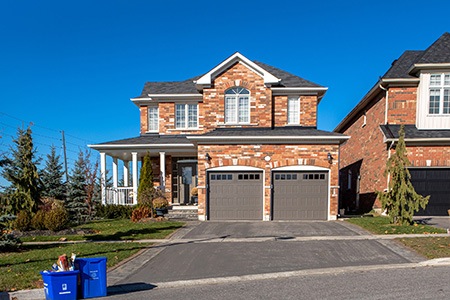
Be it a standard house, highway, school, hospital, or office, you'll see asphalt driveways everywhere. The reason behind these driveway options popularity is the low price of the material. They're sometimes called blacktop driveways, as well.
If you have a large area to cover, asphalt and even a crushed asphalt driveway will be a cost-effective choice. Also, it's extremely easy to install the material, so you can save some labor costs there.
Asphalt driveways appear as neat black and feel incredibly smooth. So, you don't have to take the trouble of painting the driveway, and parking your cars will be a breeze, though neighbors will still be happy to park in front of your house. As the black surface can sustain more heat, it will cause the snow to melt faster in the winter seasons.
Asphalt is also a flexible material and allows you to create various patterns or designs in case you want to make the driveway more attractive.
However, asphalt types of driveway materialss aren't very durable as they last only 20-25 years. Also, the material is prone to cracking, which gets worse if you don't repair it timely.
To avoid cracks, you need to resurface the area or use an appropriate sealant every 3 or 4 years. You can use a rubberized compound to curb the cracks from spreading throughout the driveway. While going for asphalt, keep all these maintenance costs in mind.
Concrete Driveway
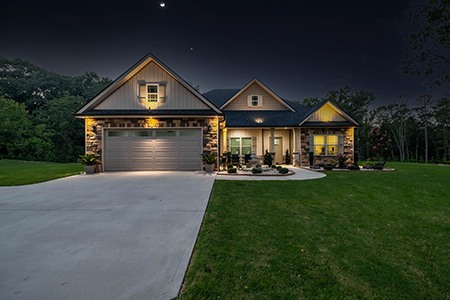
Among all the materials, concrete is probably the strongest that requires the least maintenance. You can count on the concrete surface for carrying the heaviest vehicles. Just like asphalt, concrete is also an affordable material, and it requires minimal upkeep.
However, you'll need to power wash the surface occasionally and use chemical stain removers to erase the marks of tires. Although concrete is an easy-to-install material, you need to leave it for 7 or more days to settle down properly.
It's a great choice for long running driveways or even short ones like you might expect in a patio home. With a shorter driveway you can keep your concrete driveway pristine in look without too much extra effort.
Concrete types of driveways are highly durable and generally lasts for 35 years or more. You have to figure that if it's good enough for all types of house foundations then it'll be good enough for your driveway.
As the material stains pretty well, you can paint the surface as per your preferences to make it look classy and expensive. Nowadays, concrete comes in a wide range, and you can easily choose from customized designs, patterns, and prints.
These patterns and prints come from the ability of the wet concrete to be stamped with designs, resulting in what people call a stamped concrete driveway.
Despite being exceptionally strong, concrete isn't capable of withstanding extreme cold. Repeated frost causes the surface to break, and it's a daunting task to repair a concrete driveway.
It often gets dirty and catches tire marks that you'll have a hard time removing. Otherwise, concrete is a good choice if you want a durable and low-maintenance option. You can look into the concrete alternatives too, though not all are suitable for driveways.
Gravel Driveway
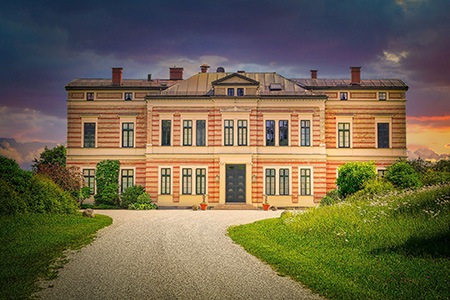
Once again, an incredibly affordable and long-lasting material. Gravel driveways are made of small to medium size rock, sand, and small-grained clay. This mixture forms a strong and dependable shape for your vehicles.
Although gravel driveways are mostly seen in rural areas, countryside homeowners are also going for it because of its affordability and naturally attractive looks. Gravel driveways can be a great contrast to intricately designed buildings.
If you want some color to your driveway, you can simply ask your contractor for colorful gravel driveway options. Unlike the other materials, gravel can last for a lifetime if you're careful about the upkeep.
However, maintaining gravel driveways isn't easy as they usually create dust and debris. The dirt spreads around the whole exterior making your cars, lawn grass, and garden plants dusty and unpleasant.
Unfortunately, gravel driveways can't hold up well against snow. As the snow falls into the gaps between the gravels, it becomes difficult to clean them. Similarly, it's also troublesome to clear the weed that grows in those gaps. Try some of our methods to get rid of weeds in your driveway permanently.
You can achieve the same look with a crushed stone driveway. The only difference is that crushed stone can provide a smoother driving and walking surface than gravel would due to the shape of the stone. You'll have the same issues with snow with these different types of driveways.
Brick or Paver Driveway

Both bricks and pavers are strong and good-looking choices for making various driveway styles. They provide a high-end, modern, and luxurious vibe to your property that increases the resale value.
You can buy the materials in several colors and shapes. Also, brick and all types of pavers can be arranged in countless beautiful patterns.
Among all the types, pavers are undoubtedly the most durable material. Usually, pavers last for around 75 years, and brick driveways can hold up for 50 years or more. It's pretty easy to clean and maintain the smooth surfaces of paver and brick driveways.
For better performance, some pavers are made permeable. So, the water molecules and heat easily pass through the material preventing all the cracks or breaks.
The only drawback of bricks and pavers is that you need to invest a fairly large amount for them. Also, you need to bear the labor cost in mind while buying the materials. It may be more suitable for a shorter driveway or most types of patios rather than a long driveway.
Basalt Driveway
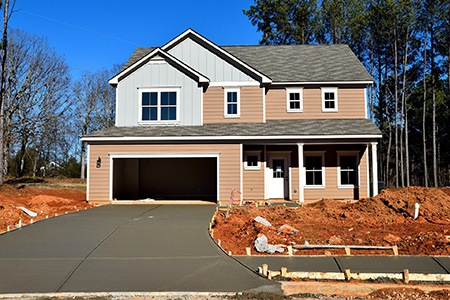
If you want your house to stand out, basalt driveway types will be a unique and long-lasting choice. Basalt slots are placed side by side to make smooth driveways, just like tiles. You can hire professionals for installation or do it yourself to save some costs.
Basal tiles are hard, dense, glossy, and durable. Its rectilinear geometry, along with the dark black or grey color, gives your house a very modern and elegant look. As the smooth surface doesn't allow any dirt or snow to stay, these driveway options don't require much maintenance.
The weather-resistant nature makes the basalt types of driveway materials truly amazing. Basal can withstand extreme cold and heat without cracking. Hence, it lasts longer than most other materials.
The main drawback of basalt is that it's an expensive and rare material. Also, you need to walk carefully on a basalt driveway as it gets heated very easily.
Cobblestone Driveway
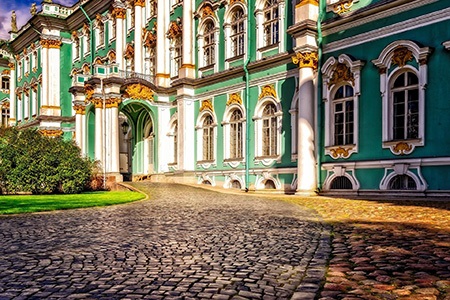
For short and compact types of driveways, cobblestone can be the most reasonable option. The old-fashioned cobblestones offer a classic, sleek look to your house. Also, they remain unchanged for decades and require minimal supervision.
Just like pavers, cobblestones can be oriented in different patterns to make them attractive and unique. Installing the stones is pretty easy, and so, the labor cost is usually low. Cobblestones don't tend to break in extreme weather conditions, and cleaning the snow and dirt will be easy for you due to the smooth surface.
However, cobblestones are expensive, and sometimes the loosely placed stones might spread in the adjacent areas. Moreover, wet cobblestone driveways can get slippery on rainy days. It's still popular in geographical areas where cobblestone was widely used. It was among the first materials used, where most houses that were built before 1850 had dirt path driveways.
Green Driveway
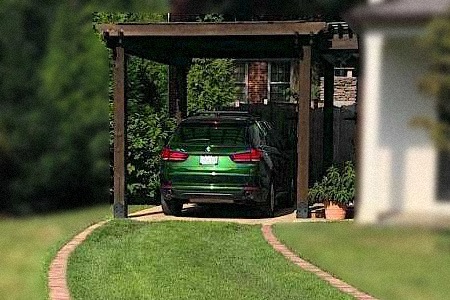
As the name suggests, this type of driveway is made of green grass. A green driveway is an environment-friendly and most desirable option for nature lovers. Even still, you need to make sure the driveway isn't too close to the property line.
Usually, there are two types of green driveway. One is made of grass which is placed over a plastic-made base so that you can drive on safely and is one of the coolest driveway alternatives..
Another type is basically a permeable concrete-made grid with small holes. Grass will grow to create a unique, green look through these holes. These last types are often called turf driveways.
Although green driveways are unique looking and resistant to weather change, they don't provide much strength like the other types. Moreover, you need to ensure proper maintenance for keeping the grass alive.
Resin Driveway
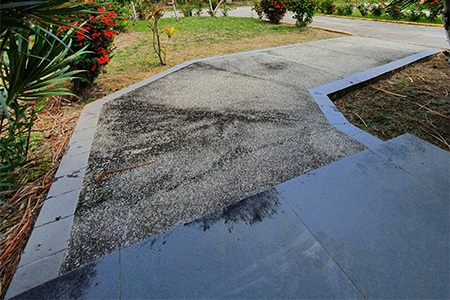
This type of driveway, sometimes called a tar and chip driveway, is a combination of polyurethane resin and aggregate stones. Depending on the mixing process, there are two types of resin driveway options:
Resin-Bond: In this type, thin layers of polyurethane resin are applied to the surface. After that, the aggregate stones are scattered at the top. The resulting material has many loose stones that give a textured look.
Resin-Bound: Here, the resin and aggregate are mixed well before applying on the surface. This way, the surface becomes smooth, water permeable, and durable.
People prefer the resin types of driveways because of its water permeability and aesthetics. Also, the material can withstand high temperatures and extreme frost. As the surface is easy to clean, it doesn't require high maintenance.
Glass Driveway
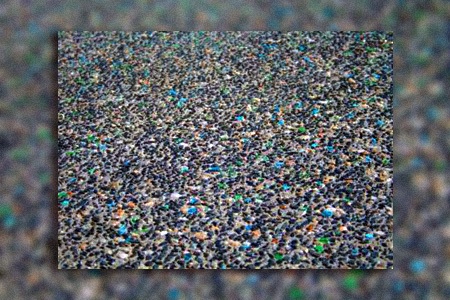
Never heard of a glass driveway before? Well, you're not alone. While most people don't know that it exists, some actually prefer glass driveways as they can choose from many delightful color options.
With glass driveway styles, you don't need to worry about cutting your tires as the driveways are similar to a hard mosaic of robust glass that is completely sealed with resin. Hence, the material is strong, easy to maintain, and resistant to high heat and cold.
As most glass types of driveway materials are made from recycled glass, it has a positive environmental effect. The surface is pretty smooth, and it prevents dirt and stains. Thanks to resin's durability and binding power, glass driveways don't require any fancy maintenance.
Types of Driveways That Bring Both Form & Function
For overall satisfactory performance, opt for concrete driveways. Gravel or asphalt can be an excellent choice if you're on a budget. Choose the right material to give your house an elegant look. And keep in mind the standard parking space dimensions so you aren't cramped.
So now you know all the different types of driveways with their advantages and disadvantages. While choosing a material, weigh the climate of your area, the design and color of your house, and the price of the material.



